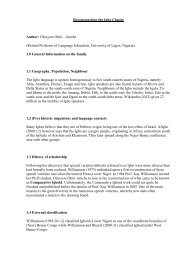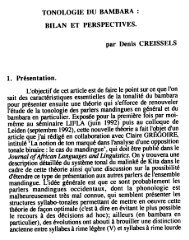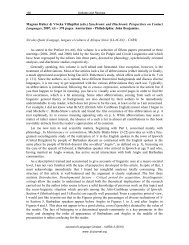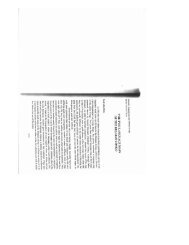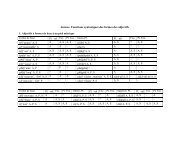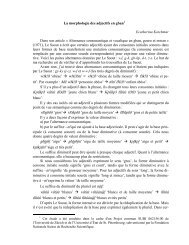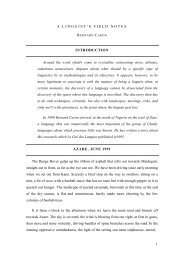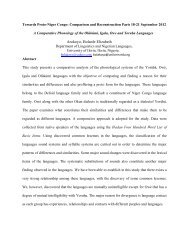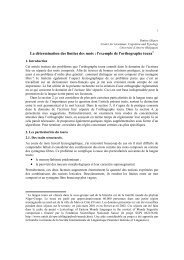Cosper, Ronald. Barawa Lexicon : a wordlist of eight South ... - Llacan
Cosper, Ronald. Barawa Lexicon : a wordlist of eight South ... - Llacan
Cosper, Ronald. Barawa Lexicon : a wordlist of eight South ... - Llacan
You also want an ePaper? Increase the reach of your titles
YUMPU automatically turns print PDFs into web optimized ePapers that Google loves.
Items 477, 495, 595 and 596 concern the ‘indefinite’ [cf. Hausa wani (sing.) /wasu (pl.)]. As a<br />
determiner, it is postposed to the noun and appears as wón / gón [gwón]. As a pronoun, it has two<br />
forms : gón (sing.) gyaa gón (pl.) resp. [gwón] and [gyaa gwón].<br />
number gloss <strong>Cosper</strong> Own data<br />
477 most gyaagwón ???<br />
495 some (wasu) gyaagwón gyaa gón<br />
595 one (wani) gwán gón<br />
596 some (wasu) gyaagwán gyaa gón<br />
A cursory look at the items concerning demonstratives is sufficient to wonder whether the author has<br />
taken the care <strong>of</strong> reading his manuscript before sending it to the printer. The same translation (gíi) is<br />
given for (601) this and (602) that , which should be resp. gín/giní and gíí, whereas (597) this is given<br />
as gíin and (598) that as gii !<br />
Generally, what strikes the reader when having a cursory look at <strong>Cosper</strong>’s lexicon is the absence <strong>of</strong> a<br />
minimum analysis <strong>of</strong> the data, which leads the author to mistaking syntagms for lexical items, or being<br />
inconsistent in his use <strong>of</strong> verbs or verbal nouns in the translations.<br />
Let’s take the following items :<br />
number gloss <strong>Cosper</strong> Own data<br />
734 fart tuurgunyoghŒn túúr‹Ën ñô‹Ñ 4<br />
748 smell 5 •uughŒnzhóghÑ wúmgËn ©ò‹Ñ 6<br />
75 mouth vii vìì<br />
704 shout dláarvi ›áár‹Ën vìì 7<br />
706 speak wúlvi wúl‹Ën vìì 8<br />
Likewise, (30), saghátkŒn (sa‹átkËn) is the verbal noun <strong>of</strong> sa‹át to be intelligent ; intelligent person<br />
should be mur ‹É sa‹ákËn<br />
The mistakes are too numerous for me to go on listing them. To conclude this passage concerning Zaar,<br />
I will just give the list <strong>of</strong> independant pronouns :<br />
Zo•i<br />
number gloss <strong>Cosper</strong> Own data<br />
608 I myân myááni / myáàn<br />
609 thou kyan kyááni / kyáàn<br />
610 he, she, it yân yááni / yáàn<br />
611 we myâni myààní / myàán<br />
612 you kyáàni kyààní / kyàán<br />
613 they yaashi yààshí<br />
The same problems appear in the work on zo•i. The general impression is that <strong>of</strong> a sloppy work due to<br />
lack <strong>of</strong> analysis.<br />
If one looks at the list <strong>of</strong> verbs given by <strong>Cosper</strong>, it is obvious that some suffixes have not been properly<br />
identified.<br />
3<br />
Lit. : it is not far/long/tall (àà = 3s. Perf.); the negation (h¢) is missing in <strong>Cosper</strong>’s translation. The adjectives<br />
ndóngat or ndúmi are a good translation. So is the verb •at, to be short. The adjective ndúúri is used to<br />
qualify something that has been shortened.<br />
4<br />
Lit : to cook shit ; [ñôghÑ] is in fact /ñôkn/.<br />
5<br />
From the Hausa sansana, one guesses the English verb is supposed to be transitive.<br />
6<br />
Lit : hear/feel a smell. •úghËn is the noun verb <strong>of</strong> the verb •u, to beat. The expression •u zhòghÑ may mean<br />
« to have a strong smell »<br />
7<br />
lit. : cut mouth ; NB : riiÑ = a shout. ÿi‹á (3s. Continuous) riiÑ = he is shouting<br />
8 lit. : say mouth.


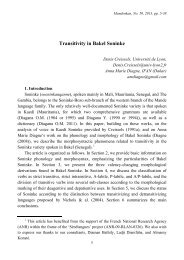
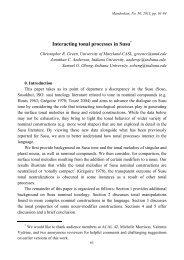
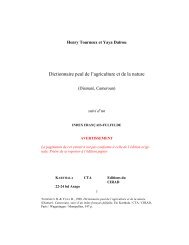
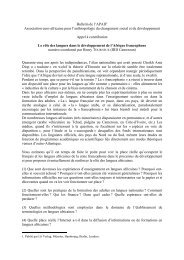
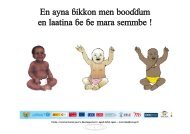
![[halshs-00645129, v1] Depressor consonants in Geji - Llacan - CNRS](https://img.yumpu.com/17832391/1/190x245/halshs-00645129-v1-depressor-consonants-in-geji-llacan-cnrs.jpg?quality=85)
